You Heard it Here First – The Chefs’ Knowledge Audiobook – AVAILABLE NOW
In a first for the chefs’ profession The Chefs’ Knowledge has gone audio. We broke new ground with our first ever book for junior chefs and now we’ve gone one step further by releasing a new audio version that takes the project in a completely new direction.
The Chefs’ Knowledge Audiobook is now available to buy on Spotify and Google Play and soon to be many more!
Buy your copy now:
Google Play CLICK HERE
Spotify CLICK HERE
 The Chefs’ Knowledge contains interviews, advice and expert knowledge as well as dramatised working professional recipes for the 100 dishes every chef should know. The new audio version is a collection of 100 scenes that brings the book to life, all acted out by 3rd years students from the Arden School of Theatre at UCEN Manchester.
The Chefs’ Knowledge contains interviews, advice and expert knowledge as well as dramatised working professional recipes for the 100 dishes every chef should know. The new audio version is a collection of 100 scenes that brings the book to life, all acted out by 3rd years students from the Arden School of Theatre at UCEN Manchester.
Catherine Farinha, publisher of The Chefs’ Knowledge explained: “We wanted to do an audio version of The Chefs’ Knowledge for a number of reasons. Chiefly because dyslexia is widespread in kitchens and a lot of chefs, especially juniors, can be at a real disadvantage because of it. However, we didn’t want to just record recipes being read out. So, we came up with something new. Our editor, Chandos Elletson, used to work in Film and Television and he wrote a few test scenes that made the recipes into little dramas. We got these acted out by real actors and they came alive. And that became the format for the new audio version.”
Elletson told The Chefs’ Forum: “What we’ve done is very unusual. We took the 100 Dishes that Every Chef Should Know idea and turned it on it’s head. What you have in the audio version are 100 imaginary scenes where junior chefs learn about dishes on the menu of a fictitious hotel. One of the examples I wrote was a scene where two honeymooners wanted to know the recipe for the granola they enjoyed at breakfast. So the head chef goes to their table and explains it. It brings the recipe alive in a way that is relatable and that’s the secret of what we’ve done. We’re hoping this really resonates with listeners who can learn by enjoying some dramatic scenes rather than listening to dry recipes.”
The Chefs’ Knowledge Audio Book is available on all major audiobook platforms at £14.99.
You can also purchase the hard copy of The Chefs’ Knowledge – The Modern Culinary Repertoire HERE.
Chef of the Week: Justin Llewellyn, Executive Chef at Parkgate Hotel in Cardiff
How long have you worked at your current restaurant?
We opened the hotel and the Sorting Room Restaurant in October 2022. The hotel is a part of the Celtic Manor Resort Collection. Our restaurant is to be somewhere you can completely relax and enjoy some fantastic food with good company.
Where did your passion for cooking come from and where did you learn your skills?
I have been in catering all my life my parents run a hotel B&B and I use to cook breakfast for the guests from early age. I studied at Colchester Avenue, Cardiff for 3 years to develop my skills further.
What do you enjoy most about being a chef?
As a chef every day is different you’re always learning. You have the opportunity to create new dishes, experiment with unique and quality ingredients. Culinary arts is an amazing field for individuals who want to showcase their creativity through food.
Name three ingredients you couldn’t cook without.
Salt, butter and garlic.
Which piece of kitchen equipment couldn’t you live without?
Thermomix – We use this piece of equipment every day, it is like having a second chef in the kitchen, it’s very versatile.
What food trends are you spotting at the moment?
Although arguably the biggest food news of the past year was the rising cost of food, which will no doubt continue to have an impact on 2023. There have also been advances in plant-based products, reducing food waste, and functional food and drink that may give everyone something to look forward to in the new year.
What do you think is a common mistake that lets chefs down?
Over complicated food with too many ingredients.
What is your favourite time of year for food, and why?
Spring time with lamb and spring vegetables, coming out of winter into spring is a wonderful time of the year.
Which of your dishes are you most proud of?
My beef wellington is my signature dish it has been on the menu since we opened the restaurant.
How do you come up with new dishes?
My menu is ingredient driven when writing our à la carte menu looking at seasonal British produce. We aim to work with as many local producers and suppliers as possible, exceptional products are key. We keep the menu concise to ensure that everything is fresh and made from scratch.
Tell us three chefs you admire.
Marco Pierre White, the youngest chef to have won 3 Michelin stars. Michel and Albert Roux – The Roux brothers opened Le Gavroche in 1967 and awarded 3 Michelin stars.
Over the last 40 years, Britain’s culinary scene has transformed. The 21st century sees a nation proud of its acclaimed chefs; there are successful restaurants the length of the country, with hundreds of them boasting awards and accolades. Yet, when Michel and Albert Roux established the Roux Scholarship in 1983, there were just 33 Michelin-starred restaurants in the Michelin Guide in Great Britain and Ireland.
What is your favourite cookbook?
White Heat by Marco Pierre White.
Who do you think are the chefs to watch over the next few months?
- Gareth Ward, he won 2 Michelin stars in 2022.
- Nathan Davies at SY23.
- Adam Handling at the Michelin star Frog Restaurant and Ugly Butterfly in Cornwall.
What’s been your favourite new restaurant opening of the last year?
In 2022, Ynyshir was awarded 2 Michelin stars, the first restaurant in Wales to achieve this. In June 2022 Ynyshir was placed as number 1 in the UK at the National Restaurant Awards.
Chef Tom Green Talks Chef Life and Mental Health at South Devon College
It’s Mental Health Awareness Month and we have begun a campaign to educate the chefs of the future, that it is paramount they get their heads in the right place early in their career. Without a proper mental foundation the life of a chef is hard and tough. With the right mindset the challenges of chef life are easy to spot and simple to navigate.
There was a time in the not too distant past when chefs welcomed the rigour of the job and took pride in the exhaustion and mental toll that came with the badge of being a head chef. Those days are over and a lot of the chefs who went on that journey are either gone from the industry or regret it. Why?
The tough guy image of burnt-out chefs was a familiar sight from the 1990’s onwards but as mental health professionals know only too well you can only keep it up for so long before something cracks. Chef Tom Green knows all about it. He’d been there, bought the T shirt and worn it.
So, how should you approach being a chef when you are just starting out?
Tom Green visited a group of 30 students at South Devon College this week to deliver a guest lecture on his career to date and share with them some ‘lived experience’ mental health tick boxes to be aware of.
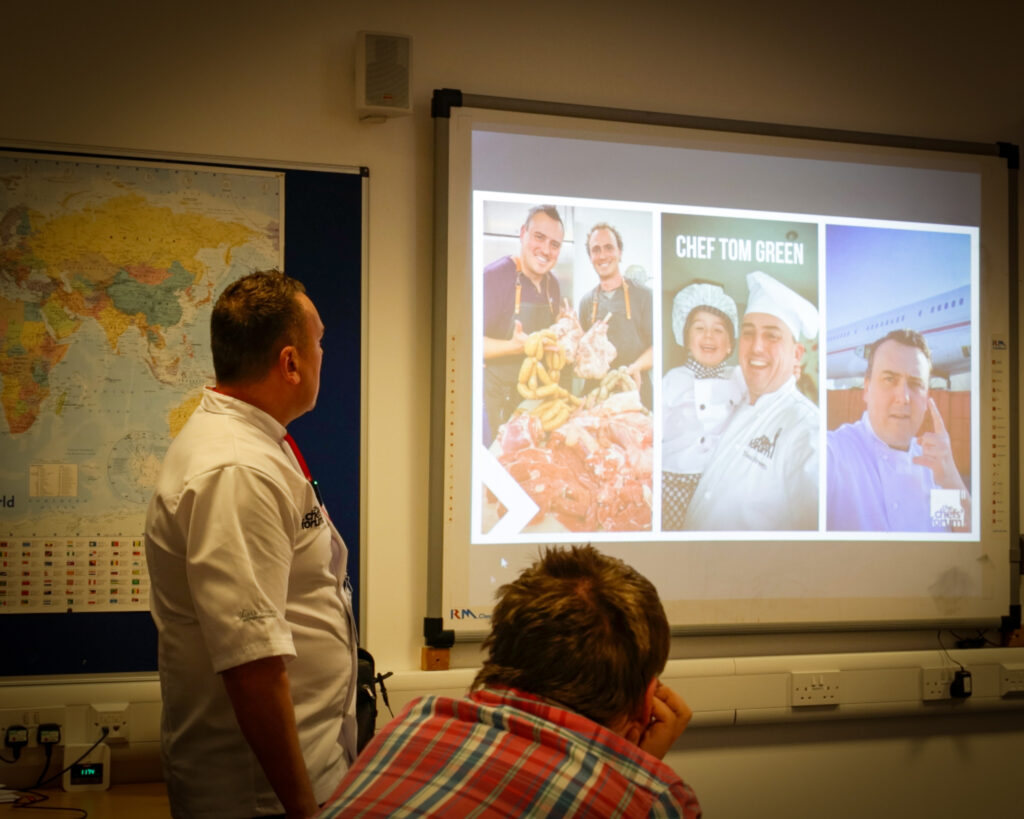 Professional kitchens are stressful, fast paced, hot and noisy. It’s good to know that in advance so you know how to prepare. Kitchens are also places full of egos and an environment that can be anxiety provoking, physically and mentally demanding and come with unsociable hours.
Professional kitchens are stressful, fast paced, hot and noisy. It’s good to know that in advance so you know how to prepare. Kitchens are also places full of egos and an environment that can be anxiety provoking, physically and mentally demanding and come with unsociable hours.
Further, the life of a chef messes with your work life balance and can have a serious effect on self-esteem. This is due to having to be as good as your team all the time. Add in the aspects of failure, poor social media reviews and critical press and you’ve got the makings of a downward spiral into substance and alcohol misuse.
Enough to put you off? It’s not the end of the world. Identifying the kitchen and the chefs you want to work with and respect is the first part of the equation of finding lasting jab satisfaction.
Here’s Chef Tom Green’s checklist for success:
- Find a place you enjoy working that aligns with your own values
- Eat properly
- Drink plenty of water
- Sleep
- Fresh air
- Exercise
- Be kind to yourself
- Be kind to others
- Don’t be afraid to ask for help
- Stress/recognise the triggers
- Find a way to deal with that stress, it is never one size fits all
- Minimise alcohol consumption
- Refrain from self medication with pain killers and other substances
Also, and this is really important. Remember that there are kitchens to work in that are far away from the stress, turmoil and heat of battle that are characterised by TV shows.
What type of chef do you want to be?
Find an employer who reflects your personal ethics and working style.
Aside from restaurants and hotels you can work in any of the following areas:
- Events
- Pop Ups
- Private Chef
- Ski chalets
- NHS
- Educatering
- Teaching
- Contract Catering
- Street Food
- Yachts
- Development Chef
- Television
He concluded: “The sky really is the limit, but just make sure you look after yourself and others on the way up there. If someone had told me when I was sitting where you are now, that I would have cooked for some of the amazing people I have had the privilege to cook for, even King Charles and Queen Camilla, then I would never have believed them, but I did and you can too.”
Film & photography by Carlos Farinha.
A Dream Lunch for Steak-loving London Chefs
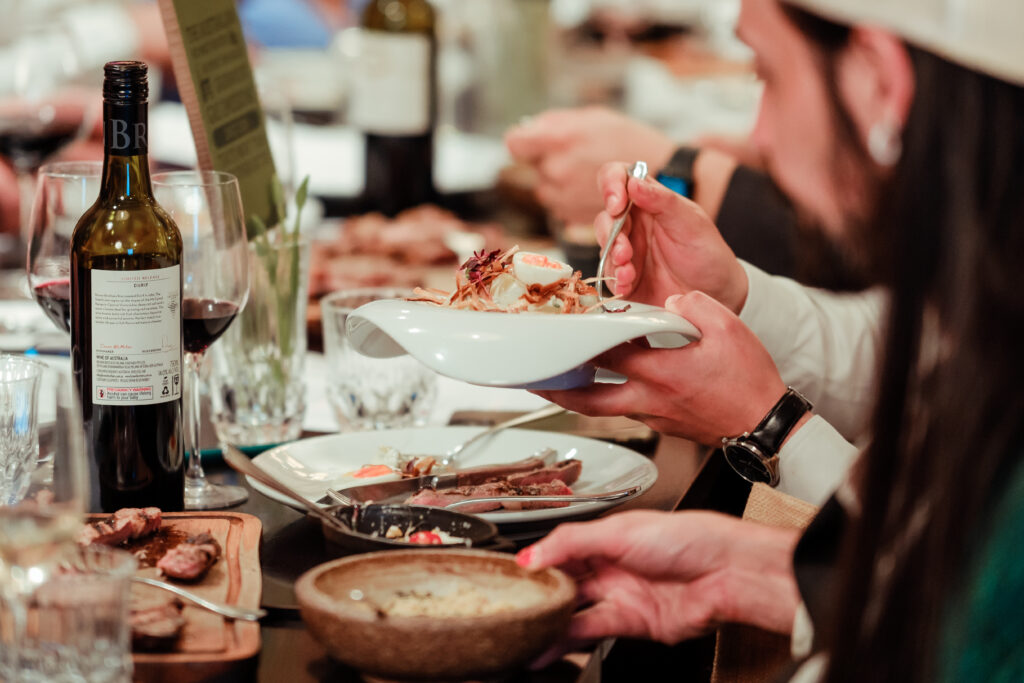 We took over Omnino Steakhouse in Leadenhall Street, London on Monday 15th May to introduce London to the joys of Aussie Beef matured in an Italian ageing machine and cooked by a group of Brazilian chefs. 60 invited guests got their fill of some of the best steaks in the world.
We took over Omnino Steakhouse in Leadenhall Street, London on Monday 15th May to introduce London to the joys of Aussie Beef matured in an Italian ageing machine and cooked by a group of Brazilian chefs. 60 invited guests got their fill of some of the best steaks in the world.
It’s the sort of thing we’re becoming known for at The Chefs’ Forum and you can expect an invite to a city near you soon because we’re taking the concept on the road.
Here’s what happened. The Aussie Beef Mates Meat Feast featured an incredible array of steaks from down under:
JBS Aberdeen Black (Angus)
- 120+ Day Grain Fed Ribeye
- 28-day aged 120+ Day Grain Fed Ribeye
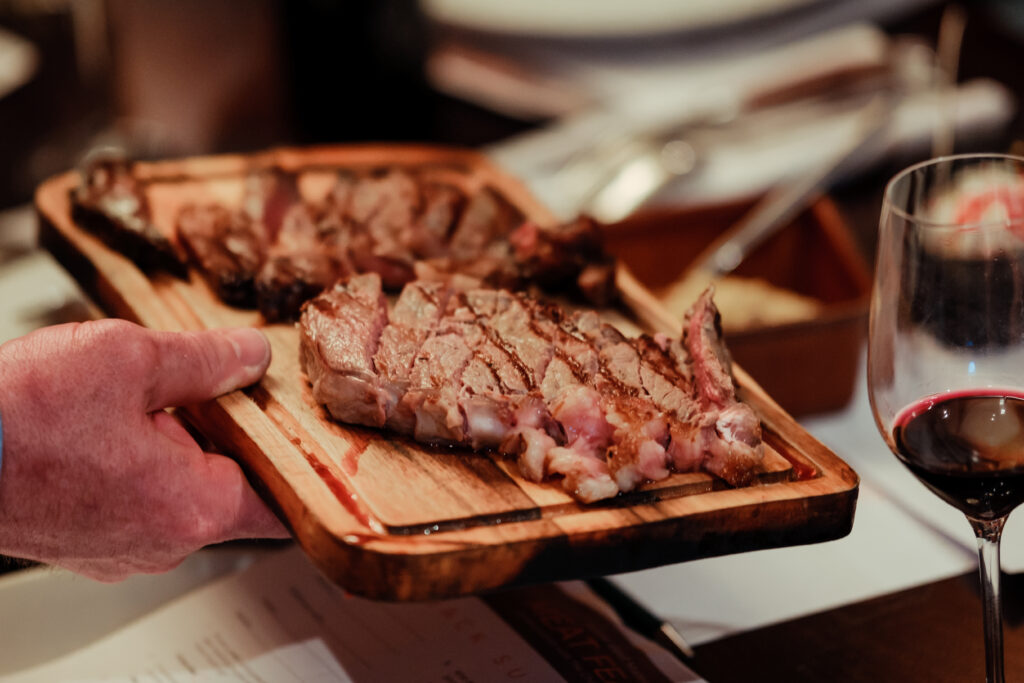
- 120+ Day grain Fed Sirion
- 28-day aged 120+ Day Grain Fed Sirloin
AAco Westholme Wagyu
- 350-Day Grain Fed Picanha
- 28-day aged 350-Day Grain Fed Picanha
Stockyard Wagyu
- 400-Day Grain Fed Bavette
All these steaks, except for the bavette, were matured in a state-of-the-art Stagionello® dry ageing machine to specific settings. The Stagionello allows chefs to preset maturation to a pre-programmed PH, humidity, temperature and ventilation during the ageing process. It sounds complicated but it really isn’t.
Evandro Bottecchia, Head of Sales at DCI Maintenance Ltd, who supplies Stagionello®, said:
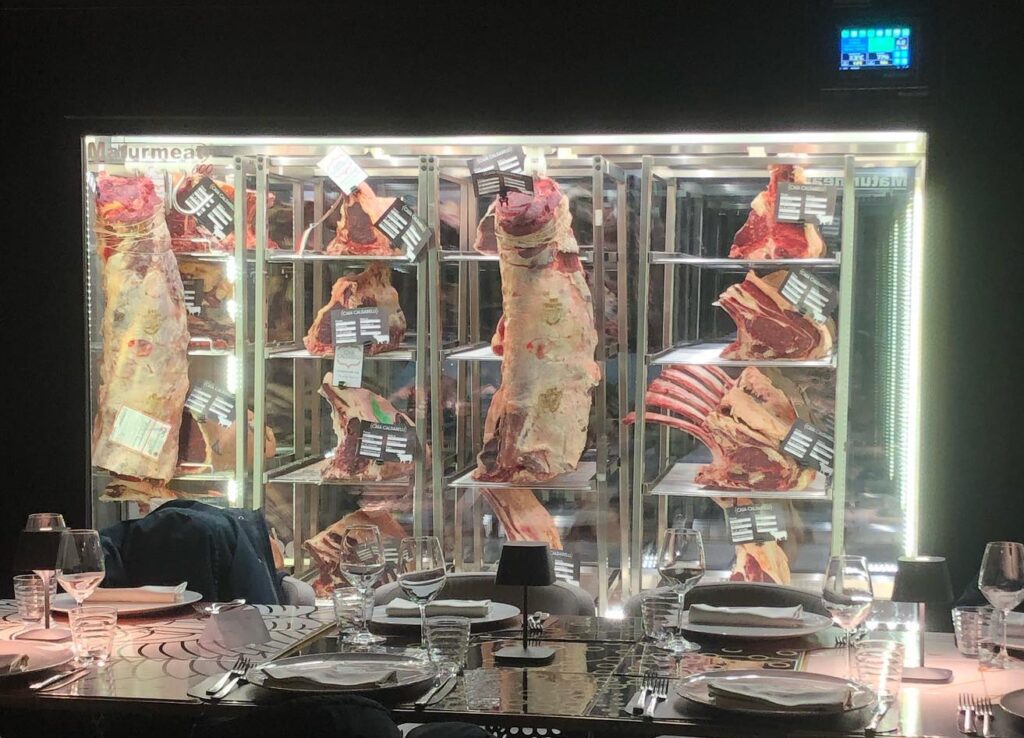 “The Stagionello® machine is a unique system for processing food transformation that uses PH control for meat maturation. It is possible to mature meat in a safe and controlled environment for up to 360 days without the use of any additives throughout the process.
“The Stagionello® machine is a unique system for processing food transformation that uses PH control for meat maturation. It is possible to mature meat in a safe and controlled environment for up to 360 days without the use of any additives throughout the process.
It was great to work with Stephen and team at Meat and Livestock Australia to film the ageing process over the last four weeks and the results on the day were simply delicious.
“It is the only device of its kind which has a cold-flavouring system that uses no heat or combustion. This conserves all the properties of the food and results in zero toxic residues.
“The Stagionello® uses a homogenous ventilation system that can result in a 14% loss of moisture during the curing process and comes with a training course and a scientific consultancy.”
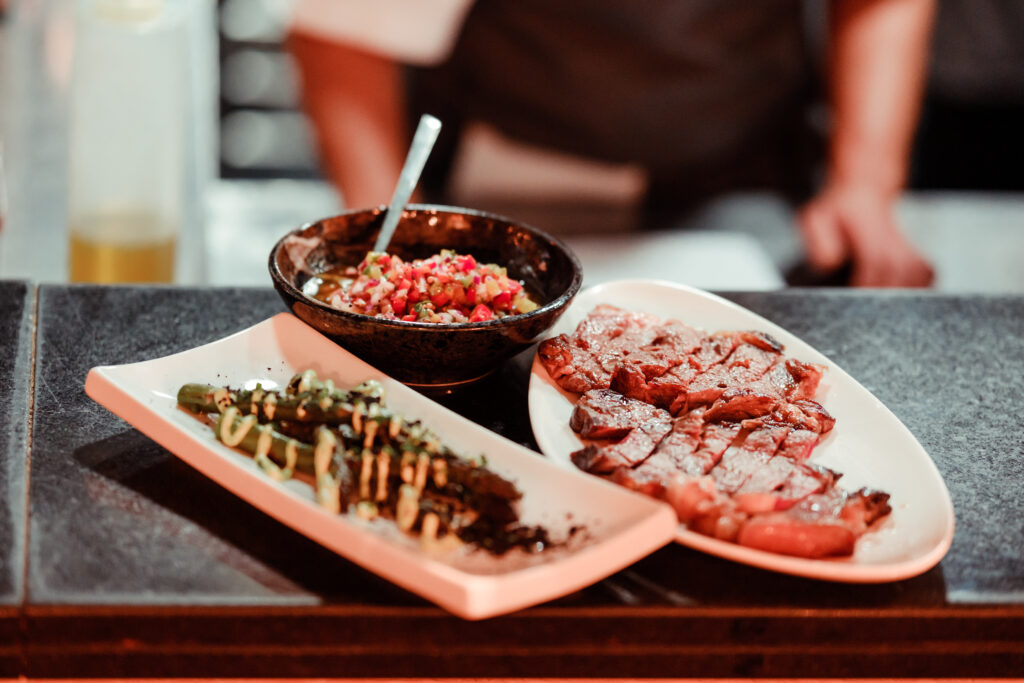 The chefs also got to try a wet-aged version of each cut – The room was split as to which they preferred, but it was an excellent opportunity to showcase the latest technology in dry ageing, compared to the flavour achieved with wet ageing.
The chefs also got to try a wet-aged version of each cut – The room was split as to which they preferred, but it was an excellent opportunity to showcase the latest technology in dry ageing, compared to the flavour achieved with wet ageing.
The steaks were cooked to perfection by the assembled Brazilian chefs who know a thing or two about how to cook meat. They also knocked up some pretty impressive sides:
Aussie Beef Mates Sides
- Farofa and Arroz Carreteiro by Eduardo Barsotti (Chef Patron, Omnino Steakhouse)
- Esquites by Aaj Fernando (Chef Consultant)
- Brazilian Vinaigrette by Marcilio Da Silva (Chef Consultant)
- Potato Salad by Cesar Scolari (Top Chef Brasil Finalist)
- Black Eyed Beans Salad by Luciana Berry (Top Chef Brasil Winner)
Dessert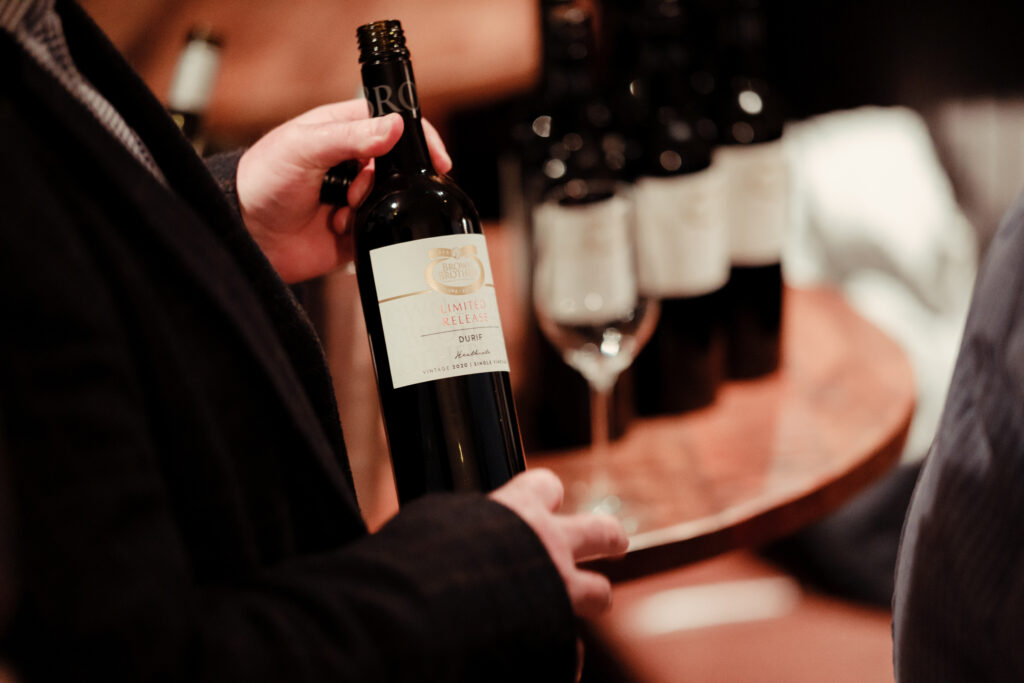
- Corn Crème Brûlée by Franciane Tartari (Executive Pastry Chef & International Judge)
Wines were sponsored by Australian Winery, Brown Brothers
- Innocent Bystander Pinot Gris
- Brown Brothers Limited Release Durif
Stephen Edwards, UK Business Manager, Meat and Livestock Australia said:
“This was a great event and it really showed how incredible and versatile Aussie Beef really is. A huge thanks to The Chefs’ Forum for pulling it all together. One of the biggest attributes of Australian beef is its consistent eating quality due to our grading systems and pathways, the various cuts of steak were beautifully cooked by expert Brazilian chefs with some really delicious sides.
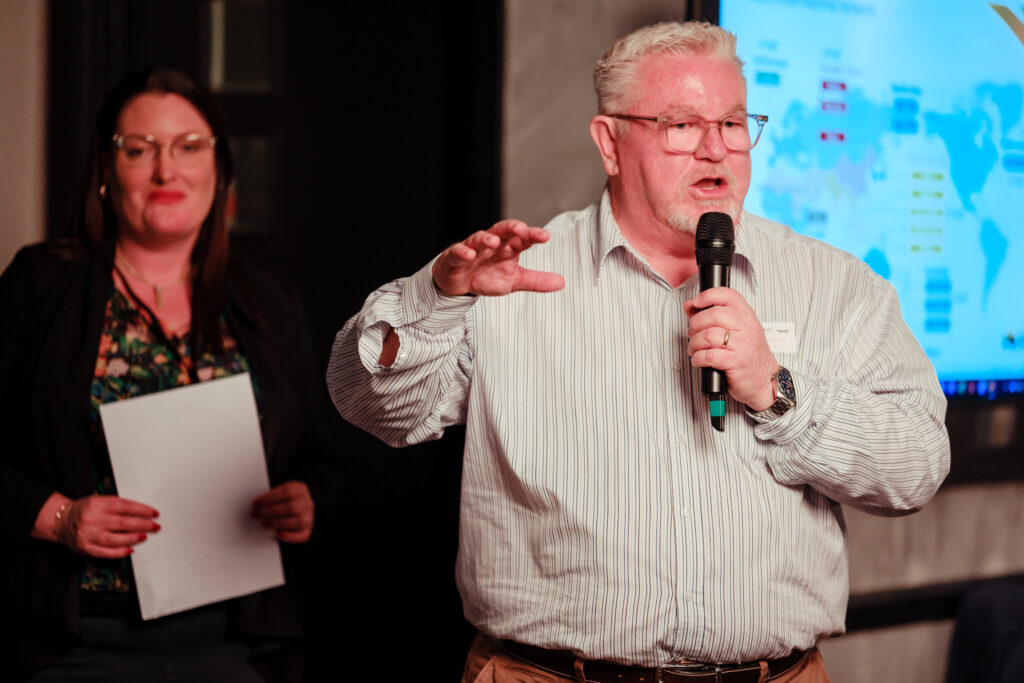 “We were also really impressed with the guest list that Catherine and the team assembled for us, they really do have great connections. Not only chefs from Michelin restaurants but also chefs from high-volume steak restaurants who really enjoyed what we have spent years building in Australia. First class. As the AUS/UK Free Trade Agreement comes in on June 1 this year we will see more variety of Aussie beef cuts finding its way to the high-quality foodservice UK market”
“We were also really impressed with the guest list that Catherine and the team assembled for us, they really do have great connections. Not only chefs from Michelin restaurants but also chefs from high-volume steak restaurants who really enjoyed what we have spent years building in Australia. First class. As the AUS/UK Free Trade Agreement comes in on June 1 this year we will see more variety of Aussie beef cuts finding its way to the high-quality foodservice UK market”
Chefs’ Forum Director Catherine Farinha said: “As a business, we are all about education. It was a pleasure to work with Aussie Beef and through our network we were able to assemble a dream team and really show off this incredible product. It went so well we are already working on taking the show on the road.”
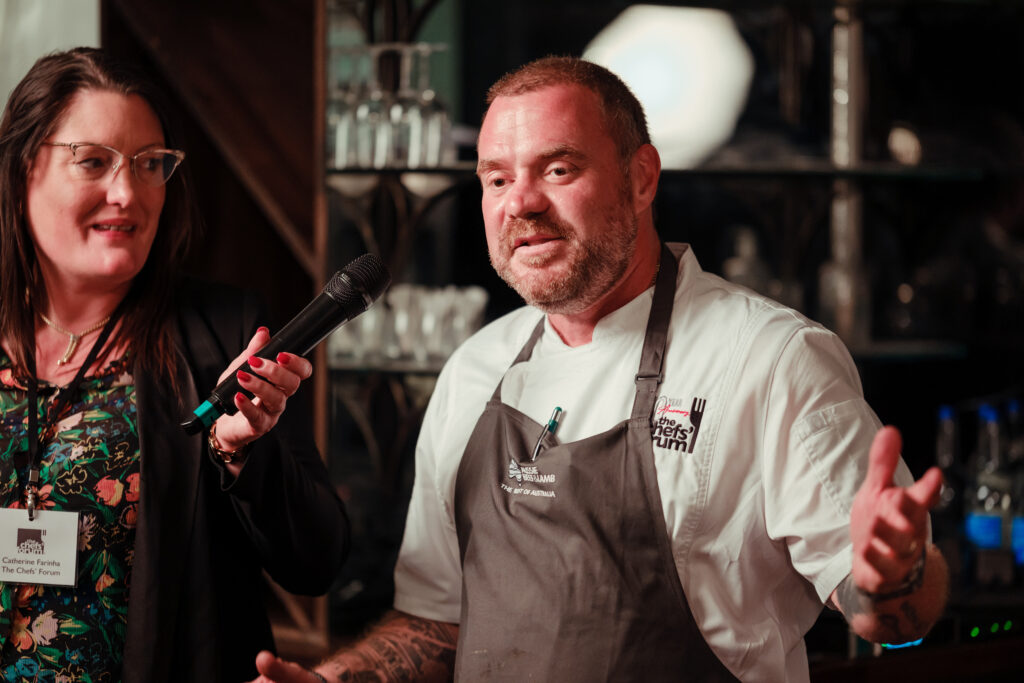 Eduardo Barsotti, Owner of Omnino Steakhouse said
Eduardo Barsotti, Owner of Omnino Steakhouse said
“It was a fantastic event and we really loved inviting the guest chefs into our kitchen to cook for 60 London chefs. There was a real sense of community and the produce was of an amazing standard. Omnino is a celebration of top-quality steak and our loyal customer base comes here expecting the very best. We look forward to welcoming the visiting chefs back again soon.”
Photography by New Era.
Less is Cure
The art of the cure is now a couple of clicks away thanks to a new, food transformation cabinet from Stagionello®.
What was once the preserve of master technicians who could harness wind and local humidity to produce world-beating cured meats, such as Prosciutto and Salami, has become possible in a kitchen. Like the Combi and the Crustastun, curing has gone tech!
Evandro Bottechia, Head of Sales at DCI Maintenance Ltd, who supplies Stagionello®, said:
Bottechia, Head of Sales at DCI Maintenance Ltd, who supplies Stagionello®, said:
“The Stagionello® machine has developed a new, patented, process for salami curing and cooking, meat maturation as well as fish curing and smoking (with Ph control) all in one smart cabinet.
“It’s a unique system for processing fermentation and controlled maturation food with pH management. It is possible to mature meat in a safe and controlled way for up to 360 days without the use of any additives throughout the process.
“It is the only device of its kind which has a cold-flavouring system that uses no heat or combustion. This conserves all the properties of the food and results in zero toxic residues.
Here is the process captured over 28-days week:
“The Stagionello® uses a homogenous ventilation system that can result in a 14% loss of moisture during the curing process and comes with a training course and a scientific consultancy.”
 Chefs’ Forum Director Catherine Farinha, said:
Chefs’ Forum Director Catherine Farinha, said:
“The Stagionello® took centre stage at a special Meat Feast we are hosted at Omnino Steakhouse in London with Meat & Livestock Australia. As well as trying and tasting prime cuts of Aussie beef, the chefs also had the opportunity to try some cuts that had been matured for 28-days in a Stagionello® machine, under the careful watch of Brand Ambassador, Chef Junior Menezes. We’re all really excited to see what chefs will make of the technology and how they will start using it!”
The idea is to teach our college lecturers how to use the technology, so they can in turn teach students in our network of Chefs’ Forum Academies across the UK.
Rum Baba Wins Student Pastry Chef of the Year 2023
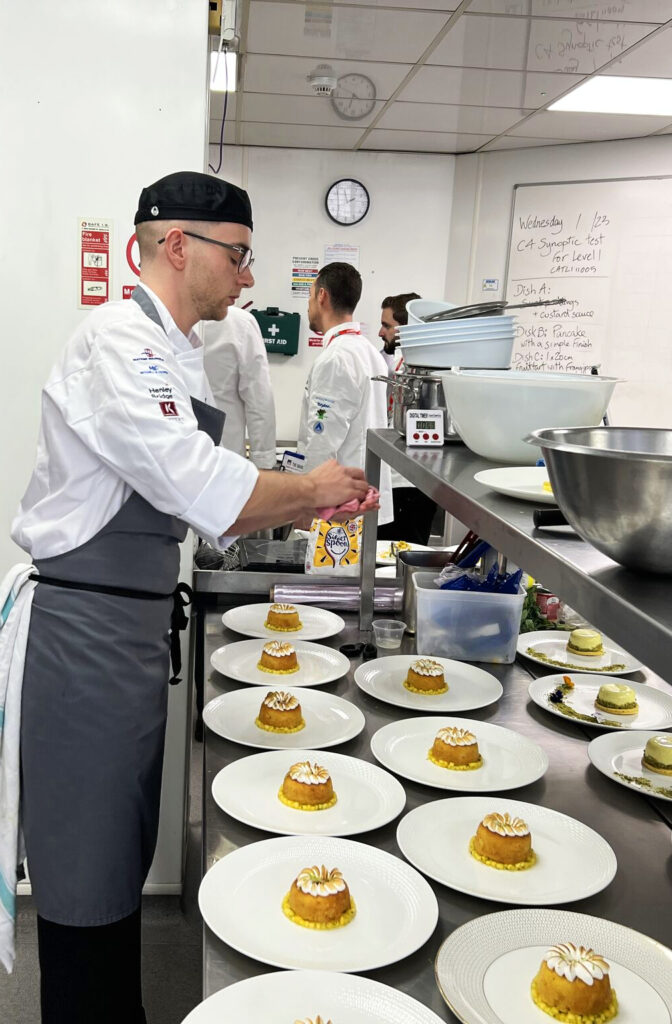 Kai Whittaker (23) won the 2023 Student Pastry Chef of the Year competition, organised by leading chef networking organization, The Chefs’ Forum. The high-profile event with a star-studded judging panel was held on Wednesday May 10th May at West London College.
Kai Whittaker (23) won the 2023 Student Pastry Chef of the Year competition, organised by leading chef networking organization, The Chefs’ Forum. The high-profile event with a star-studded judging panel was held on Wednesday May 10th May at West London College.
Whittaker, Patisserie and Confectionery Level 2 student is also enrolled at West London College which brought great joy to the hosting college.
There were two sets of winners. The visiting chefs and suppliers judged based on looks and the pastry judges chose the final 3. Kai Whittaker’s baba au rum, soaked in rum and filled with coconut chocolate ganache and cream.
The baba also contained passion fruit curd, pineapple and mint – Topped with perfect crowns of Italian meringue – Delicious? The judges thought so and the reason why it was judged best overall – Kai’s plated dessert won the judges hearts, and he was also voted 2nd for ‘looks only’ by a tough audience of over 50 chefs who attended the event, to ensure the room of top chefs agreed with the decision.
Who were the judges?
- Michael Kwan – Executive Pastry Chef at The Dorchester and UK Pastry Team
- Michael D’Angelo – Head Pastry Chef at Louie London
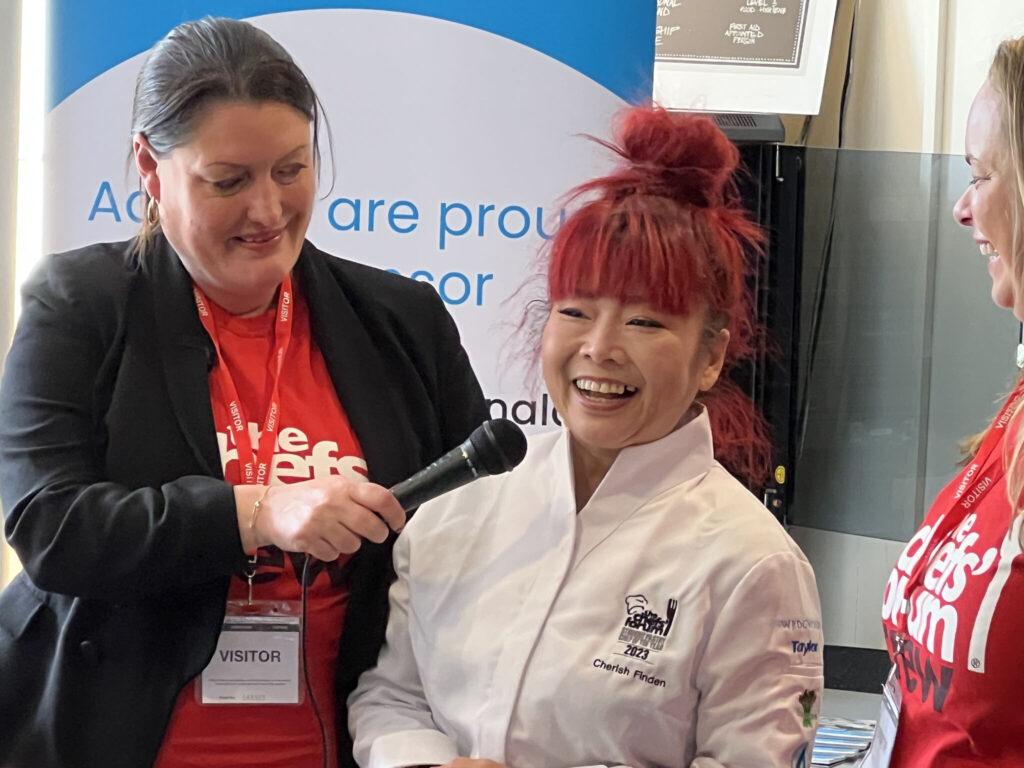
- Franciane Tartari – Head Pastry Chef and International Judge
- Enrico Carloni – Head Pastry Chef at The Peninsula
- Biju Joshwa – Executive Pastry Chef at Sheraton Grand Park Lane
- Cherish Finden – Bake Off: The Professionals Judge
- Nelson Sa – Head Pastry Chef at South Place
- Thibault Hauchard – Executive Pastry Chef at Claridge’s
- Benoit Blin – Executive Pastry Chef at Le Manoir aux Quat’Saisons/Bake Off: The Professionals Judge
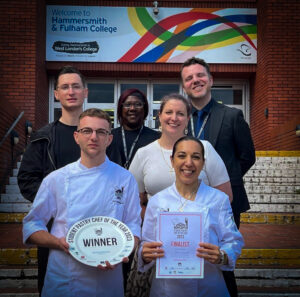 Kai received a hand-painted trophy by luxury tableware brand, Wedgwood, which is a fantastic memento of his wonderful achievement.
Kai received a hand-painted trophy by luxury tableware brand, Wedgwood, which is a fantastic memento of his wonderful achievement.
Second place went to Katrina and third to Jack, who each won an amazing goody bag packed with vouchers, Wedgwood cake stands, Koppert Cress vanilla and a whole host of goodies from Henley Bridge, Adande Refrigeration, Mitchell & Cooper, Matfer Bourgeat, First Choice Produce, Bragard and Taylor UK.
“It’s a major triumph for the hosting college,” said Catherine Farinha, Chefs’ Forum Founder afterwards. “We are so proud for West London and the work our Chefs’ Forum Academy does here.”
Whittaker’s winning dish comprised of a rum baba (baba au rum) with passion fruit curd, coconut chocolate ganache, cream and white chocolate cream, Italian meringue and pineapple tartar. It was plated on a Gio Gold plate by Wedgwood and used chocolate by Republica del Cacao, kindly supplied by Henley Bridge Ingredients.
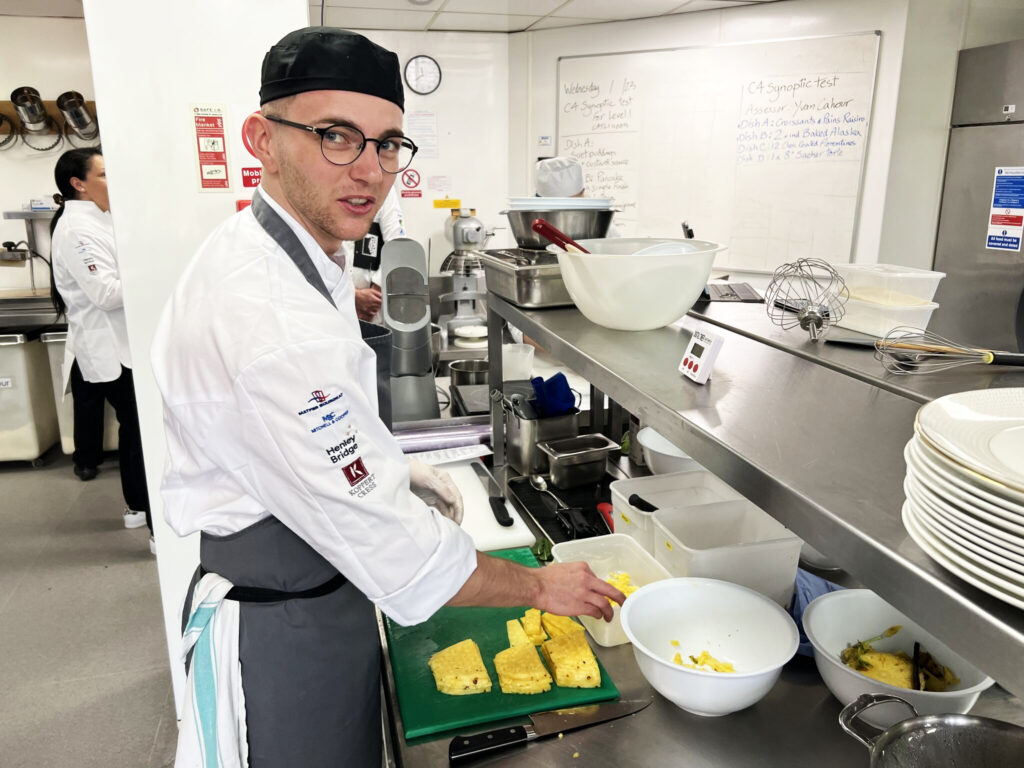 Kai told the Chefs’ Forum: “It is such a privilege to win this great competition. I can’t believe it. The judging panel is as good as it gets. Wow!”
Kai told the Chefs’ Forum: “It is such a privilege to win this great competition. I can’t believe it. The judging panel is as good as it gets. Wow!”
Denise Charles, Head of Curriculum for Service Industries was delighted to host the competition, she said
“We were delighted to host this prestigious competition for the second time and enter it for the third year running – We were absolutely over the moon that one of our learners won. We really are so proud of Kai and the hard work he has put into this competition. I would like to thank all finalists and their lecturers for visiting and cooking at West London College yesterday and they were all an absolute credit to their colleges – The future of patisserie in the UK is looking very bright indeed!”
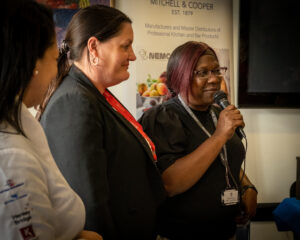 Tartari, lead judge said: “This year we set a high bar for the students, and they really delivered. Kai Whittaker’s rum baba was a real demonstration of skill and showed why it is so important to study the craft of pastry. Every element of his dish was perfect, and he was a worthy winner in a strong field.”
Tartari, lead judge said: “This year we set a high bar for the students, and they really delivered. Kai Whittaker’s rum baba was a real demonstration of skill and showed why it is so important to study the craft of pastry. Every element of his dish was perfect, and he was a worthy winner in a strong field.”
Catherine Farinha said: “The Student Pastry Chef of the Year Competition is an important part of our calendar and to get so many interested students who are keen to be involved is very encouraging. This year’s finalists all gave everything and it was a joy to watch from the sides.
“A big thank you to West London College for hosting and to all our amazing judges and suppliers who made it possible.”
Huge congratulations to all 8 finalists and we would love you to enter again if you are still in college next year – We’re certain you have an extremely bright future ahead of you!
Winner
Kai Whittaker, West London College
Second place
Katrina Tañas Atienza, University of West London
Third place
Jack Morris, Coleg y Cymoedd
Finalists
Husnaa Kaka, Leicester College
Gemma Collick, Leicester College
Mali Leese, Coleg y Cymoedd
Oraib Al-Shareeda, West London College
Abby Webster, North Kent College
Chef of the Week: Junior Menezes, Private Catering Chef in London
How long have you worked at your current restaurant?
I have been employed in the culinary industry for over twenty years, and have been working with bespoke catering for the past six years.
Where did your passion for cooking come from and where did you learn your skills?
My curiosity for cooking began at a young age of eight when I assisted my uncles in the kitchen. My inquisitive nature and passion for the craft have propelled me to where I am today.
What do you enjoy most about being a chef?
The satisfaction of my customers and the creative process of crafting new dishes are the aspects that I enjoy most about being a chef.
Name three ingredients you couldn’t cook without.
Thyme, olive oil, and garlic are three ingredients that I consider essential in my culinary creations.
Which piece of kitchen equipment couldn’t you live without?
My knives are an indispensable tool in my kitchen, and I cannot imagine creating my culinary delights without them.
What food trends are you spotting at the moment?
I have a particular interest in the “real food” trend, which promotes the use of fresh and natural ingredients, and minimizing processed foods.
What do you think is a common mistake that lets chefs down?
In my opinion, a common mistake that chefs make is prioritizing financial gain over their passion for cooking, which can result in a lack of creativity and diminished quality in their dishes.
What is your favourite time of year for food, and why?
As a Brazilian, I am particularly fond of the summer season, which provides ample opportunities for grilling beef over an open flame.
Which of your dishes are you most proud of?
While I strive to take pride in all of my creations, currently, the most popular dish I serve at my events is the “Lemon-Crusted Salmon with Parmesan Mash and Grilled Asparagus.”
How do you come up with new dishes?
I am often inspired to create new dishes by my culinary experiences during my travels or by trying new and unique ingredients. I then explore various techniques and methods to create a dish that bears my signature style.
Who was your greatest influence?
My family has been my greatest influence, and every achievement that I make is to honor them.
Tell us three chefs you admire.
I greatly admire Chef José Andrés, Chef Gary Rhodes, and Chef Eric Bédiat for their culinary prowess, innovation, and dedication to the craft.
What is your favourite cookbook?
My favourite cookbook is “Salt, Fat, Acid, Heat.”
Who do you think are the chefs to watch over the next few months?
I believe that following the pandemic, we can expect to see a wave of exciting and innovative chefs emerging from all corners of the globe.
What’s been your favourite new restaurant opening of the last year?
I have thoroughly enjoyed the Asian-inspired dining experience at “Humble Chicken 2.0”.
Pop in and Have a Chaat at Talwar Express!
We are always pleased when chefs and hospitality leaders open new places and happy to spread the word. Ex-GM of Bristol’s The Mint Room and Bandook, Mohan Shanmugam has opened his first restaurant, along with Executive Chef and Business Partners, Muraliraj Narahimaraj and Murthy Ganta.
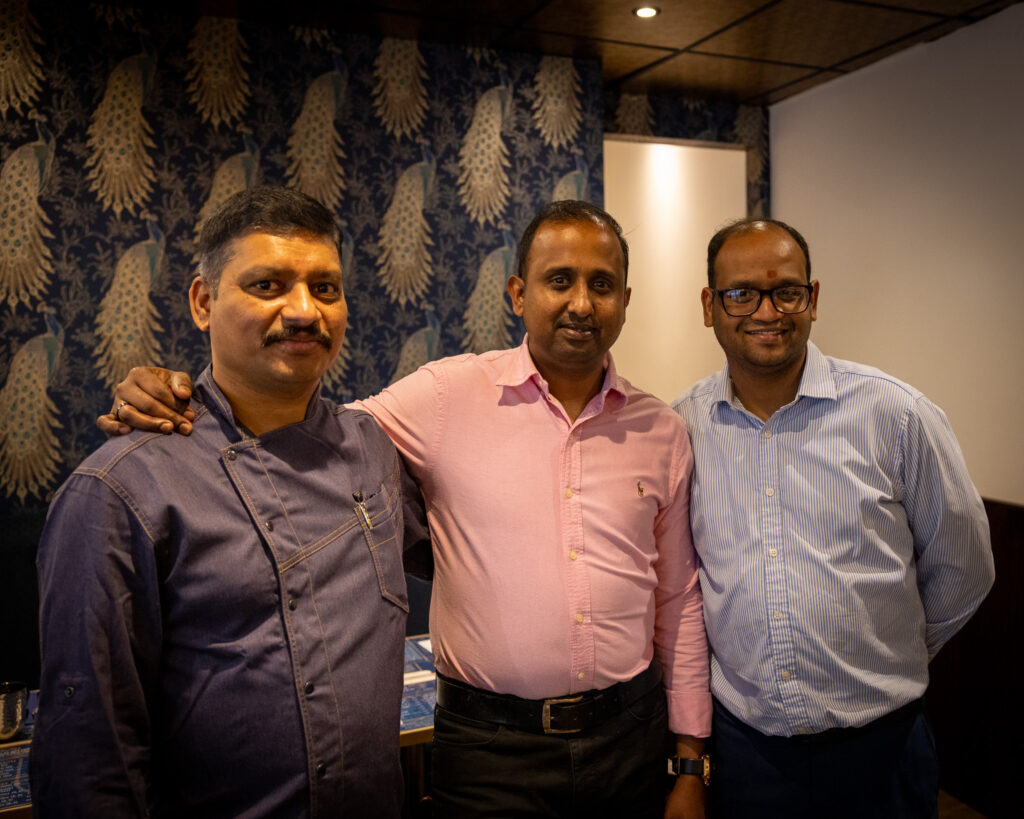 The hospitality trio are more of a work family, have a fantastic rapport and have worked all over the country together, notably at Birmingham’s Lasan Group and London’s Bombay Bustle Indian street food restaurant in Mayfair by the Leela Palaces Group.
The hospitality trio are more of a work family, have a fantastic rapport and have worked all over the country together, notably at Birmingham’s Lasan Group and London’s Bombay Bustle Indian street food restaurant in Mayfair by the Leela Palaces Group.
Talwar Express is modelled on these hugely popular Indian street food spots and the style of cuisine is very much from the Southern region – Tamil Nadu; Both Mohan and Murali hail from the Chennai and Tamil is their spoken language.
Talwar means sword in Tamil and is representative of the determination and gumption that the team have displayed since arriving in the UK with big dreams in 2008. It is this hard work and dedication that has led to the opening of Talwar Express and the Bristol Food Media Lunch was a celebration of the cumulation of their labour of love.
The Chefs’ Forum were delighted and honoured to have been asked to gather the great and the good of Bristol’s foodie glitterati for a special Bristol Food Media Lunch to firmly launch the restaurant in a city, where world street food is extremely well-represented and a total of ninety one languages and cultures celebrated.
We have worked with the team for the last six years, staging many culinary events, both at their restaurants for chefs, as well as high profile customer events and new model launches for both Bristol Audi and Bath Audi.
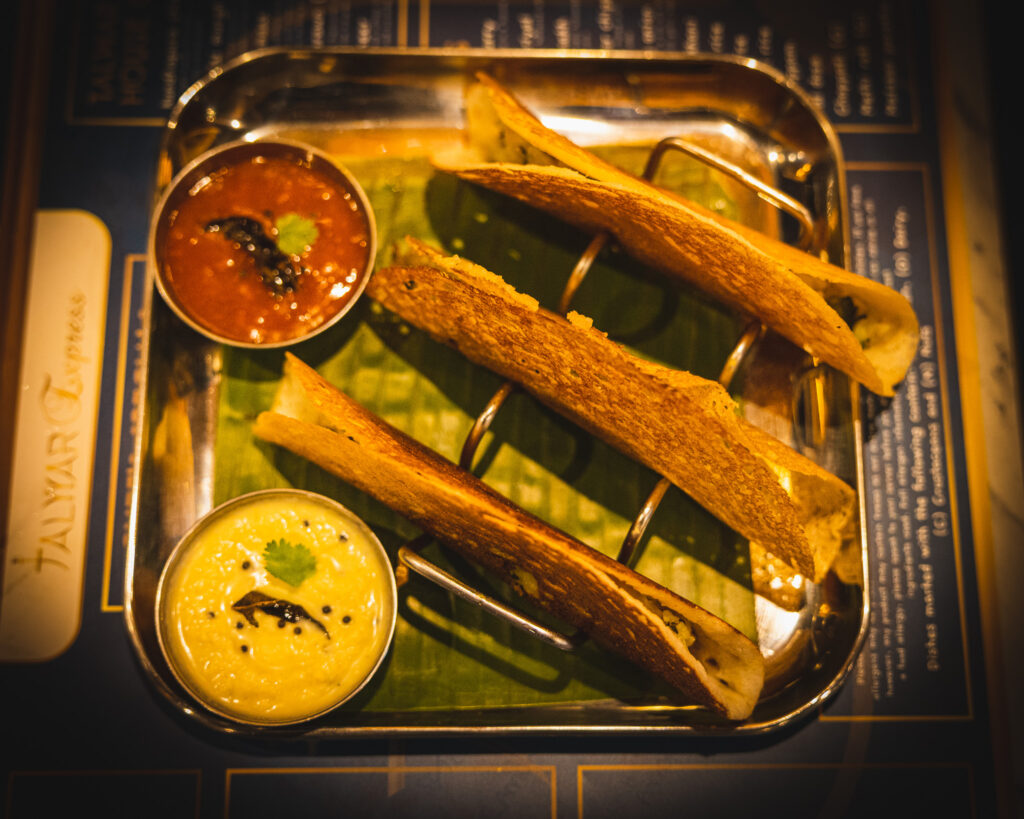 “Talwar Express is a homage to Indian street food,” Mohan told Catherine Farinha. “It’s a style of food that I grew up with and it’s close to my heart. You’ll find staples like chaats and street specials as well as light, healthy plates to share, as well as curries and all sorts of sides.”
“Talwar Express is a homage to Indian street food,” Mohan told Catherine Farinha. “It’s a style of food that I grew up with and it’s close to my heart. You’ll find staples like chaats and street specials as well as light, healthy plates to share, as well as curries and all sorts of sides.”
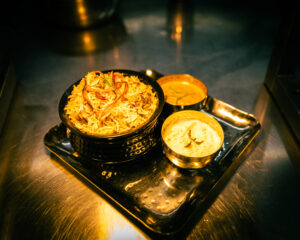 “It’s a really interesting menu from someone who really knows the subject,” Catherine Farinha enthused after a taste of the food. “We enjoyed a Mysore Masala Dosa, Lahori Lamb Chops, a Mughlai murgh and gunpowder chips. It was fantastic.
“It’s a really interesting menu from someone who really knows the subject,” Catherine Farinha enthused after a taste of the food. “We enjoyed a Mysore Masala Dosa, Lahori Lamb Chops, a Mughlai murgh and gunpowder chips. It was fantastic.
“What I really loved was the way the menu was laid out. It’s unfussy and easy to understand and moves the regular Indian menu format in a new direction. We all felt we could order in any different direction and the plates to share were generous. It’s great to see Mohan doing something he really loves.”
There were some fantastic comments from Bristol’s merry band of food writers and bloggers; Here were some of the comments:
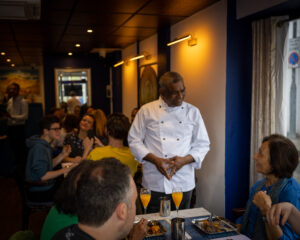 “The food was absolutely faultless, just like home, we’re now going to hold our celebratory lunch here for fifteen members of 91 Ways.”
“The food was absolutely faultless, just like home, we’re now going to hold our celebratory lunch here for fifteen members of 91 Ways.”
Mrs Baljeet Marwah, 91 Ways to Build a Global City
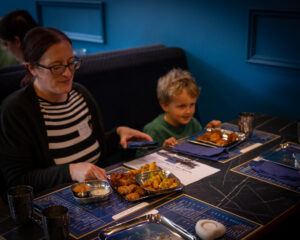 “It was all so good – One of our favourite dishes was the flavour-packed Kale Pakoda – Get yourself down to Talwar Express if you haven’t already!”
“It was all so good – One of our favourite dishes was the flavour-packed Kale Pakoda – Get yourself down to Talwar Express if you haven’t already!”
Emily Henley, Bristol Bites
“The Perfect way to spend a Bank Holiday, what a pleasure to enjoy well-executed South Indian Food served in small plates at the Bristol Food Media Lunch – Thank you for cooking Chef Muraliraj Narashimaraj.”
Ramona Andrews, Multi-Award-Winning food and cookery writer
This really was the perfect way to spend a Bank Holiday and we would urge you to check it out when next in Bristol.
You can find Talwar Express here www.talwarexpress.com
Photography and film by Carlos Farinha.
Ultrasound’s About Right – Waveco® The Brilliant New Tech in Protein and Maturation
We bet you never thought that a water bath could do more than cook at low temperatures. New science developed over the last few years has shown that by using ultrasound, a water bath can be turned into a maturation machine that drastically cuts the time meat, fish and vegetables ripen or mature.
Ultrasound works in food preparation in a unique way. By treating liquid with ultrasound at specific frequencies tiny bubbles are created every second and when they shrink and form again pressure is exerted in the liquid. Lost? Yes, us too. This is bonkers science but stick with it.
Imagine this: You put a piece of fresh, non-matured meat into a vac-pac bag and put it into a water bath. You press a few buttons and the machine goes to work. The result, sometime later, is mature meat that has no weight loss or shrinkage and softness that only comes with ageing. It works with meat, fish and vegetables.
 What does this mean? Take pheasant, for example. This is often fresh and hard to cook because chefs and customers don’t like the old tastes of hung game – the traditional way to soften up game. By using ultrasound, the pheasant breast can be matured at room temperature in the water bath using Ultrasound into something completely new. The result is softer and has the maturation required to be easier to cook with better flavour.
What does this mean? Take pheasant, for example. This is often fresh and hard to cook because chefs and customers don’t like the old tastes of hung game – the traditional way to soften up game. By using ultrasound, the pheasant breast can be matured at room temperature in the water bath using Ultrasound into something completely new. The result is softer and has the maturation required to be easier to cook with better flavour.
Interested? We were. This science is not widely available yet, but those chefs interested in the technology should look at the new machines by Waveco®. This Italian company has patented technology that will revolutionise the way you treat meat, fish and vegetables and enable you to use younger meat – which hasn’t shrunk due to traditional mentors – and guarantee specific maturation.
Waveco® standardises the meat manipulation process by ensuring quicker meat ageing while reducing weight loss without any loss in terms of nutritional values. The process is performed at room temperature and ensures softer, juicier meat.
The Waveco® method allows you to improve the procedures you usually perform in your kitchen while shortening preparation time, reducing cooking temperature and improving the subsequent phase of food storage, thanks to the action of ultrasounds, which reduces the bacterial load and therefore considerably extends the shelf life of the final product.
Waveco® will make its Chefs’ Forum debut at a special event all about meat at Omnino Steakhouse in London’s City District later this month, any chefs wishing to know more or to book a demonstration at their restaurant should contact Evandro Bottecchia, Head of Sales at DCI Maintenance: evandro@dcimaintenance.co.uk
Chef of the Week: Satish Nalli, Executive Chef at Leaf Hotels & Chameleon Café in Kent
How long have you worked at your current restaurant?
I have worked 21 years at Leaf Hotels Ltd as an Executive chef and I am concurrently running the Chameleon Café, located on the coastline of Hythe in Kent since 2019.
Where did your passion for cooking come from and where did you learn your skills?
My passion for cooking originated from the Institute of Hotel Management in Hyderabad, India. I further developed my skills working at Taj hotels & Resorts in India. During my time my initial years in hospitality, I tried my best to cultivate the best skills I observed from the chefs I worked with in India.
What do you enjoy most about being a chef?
The challenge of creating dishes to suit various palates and getting positive feedback is incredibly rewarding, as well as passing on the tips and tricks of the trade to budding chefs.
Name three ingredients you couldn’t cook without.
Salt, whole spices and curry leaves. I also feel that cooking with intent and love is important – although these are not necessarily ingredients.
Which piece of kitchen equipment couldn’t you live without?
There are several to name, but I’d say a good Chinese cleaver does multiple jobs.
What food trends are you spotting at the moment?
Plant based, sugar free and healthy foods that are good for gut health are particularly interesting to me.
What do you think is a common mistake that lets chefs down?
A failure to understand how ingredients react to various cooking conditions over time, and how to retain and optimise flavour by understanding this.
What is your favourite time of year for food, and why?
Although produce is available throughout the year due to farming techniques cultivated across the globe, the time period between spring and summer is certainly my favourite time. The produce tends to be healthy, fresh, and colourful.
Which of your dishes are you most proud of?
The Rump of Lamb with baby Vegetables & Lyonnaise of Potato with Madeira Jus at Leaf Hotels and the Samosa Chaat at Chameleon Café.
How do you come up with new dishes?
I do take inspiration from the greats in the culinary industry and try to add seasonality to the dishes. I try to experiment with new flavours and never forget the basic tenets of cooking while creating a new dish.
Who was your greatest influence?
The renowned Chef Vivek Singh.
Tell us three chefs you admire.
Chef Raymond Blanc, Chef Vivek Singh, and Chef Massimo Bottura.
What is your favourite cookbook?
Larousse Gastronomique & Theory of Cookery by Tangam Phillip from my college days!
Who do you think are the chefs to watch over the next few months?
I unfortunately have not been following the up and coming talent since the COVID-19 pandemic, however I do have to give an honourable mention to Chef Craig Edgell (Buoy & Oyster) as he created one of the best fish dishes I had eaten in a while during The Chefs’ Forum event at Hythe Imperial, Kent.
What’s been your favourite new restaurant opening of the last year?
I unfortunately cannot name any restaurant in particular in Kent, however I would say that more people should take the leap to open businesses with more experimental cuisine in this area!











